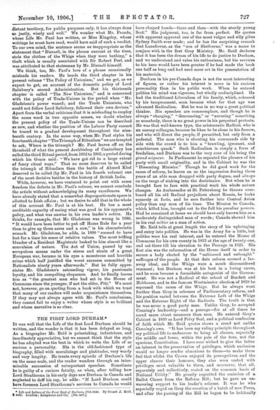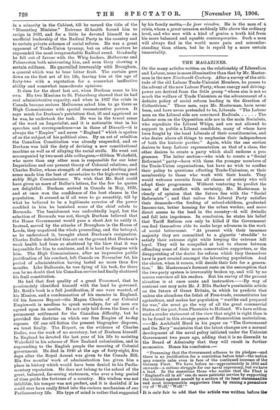THE FIRST LORD DURHAM.* IT was well that the Life
of the first Lord Durham should be written, and the wonder is that it has been delayed so long. As a biographer Mr. Reid is painstaking, industrious, and inordinately appreciative, but we cannot think that the style he has adopted was the best in which to write the Life of so curious a personality. His is the old-fashioned type of biography, filled with moralisings and platitudes, very wordy and very lengthy. He treats every episode of Durham's life on the same scale, and the reader wanders through an inter- minable succession of unimportant speeches. Sometimes he is guilty of a curious fatuity, as when, after telling how Lord Strathcona in his early days saw Durham in Canada and neglected to doff his cap, he adds : "If Lord Durham could have foreseen Lord Strathcona's services to Canada he would
• Life and Letters of the First Earl of Durham, 1702-1840. By Stuart J. Reid. 2 vols. London Longmans and Co. paa. net.]
have clasped hands—there and then—with the sturdy young Scot." His judgment, too, is far from perfect. He quotes with apparent approval one of the most vulgar and silly gibes Sydney Smith ever made; and he has the surprising remark that Lansdowne, as the "son of Shelburne," was a name to conjure with in the first Grey Ministry. Mr. Reid declares that it has been the dream of his life to do justice to Durham, and we understand and value his enthusiasm, but his services
to his hero would have been greater if he had made the book one half as long and had used more art in the presentation of his materials.
Durham in his pre-Canada days is not the most interesting of figures, or rather his interest is more in his curious personality than in his public work. When he entered politics his mind was vigorous, but wholly undisciplined. He had the traditional Liberalism of his family, which, coloured by his temperament, soon became what for that age was advanced Radicalism. But he was in no way a great political thinker. His speeches are commonplace, and though he is always "charging," "denouncing," or " accusing " something or somebody, there is no great power in his perpetual protests. He was that well-known type, the aristocratic Radical, who is an uneasy colleague, because he likes to be alone in his furrow, and who will direct the people, if permitted, but only from a pedestal. The man who is shouting his commands side by side with the crowd is to him a "brawling, ignorant, and mischievous quack." Such Radicalism is simply a form of feudalism, and Durham was to the very core of his being the
grand seigneur. In Parliament he repeated the phrases of his
party with small originality, and in the Cabinet he was the "Dissenting Minister." Though he did good work for the cause of reform, be leaves on us the impression during these years of an able man drugged with party dogma, and always on the verge of sinking into the doctrinaire. But when he is brought face to face with practical work his whole nature changes. As Ambassador at St. Petersburg be throws over- board all his old Radical prejudices about Russia, he looks squarely at facts, and he sees further into Central Asian policy than any man of his time. The Mission to Canada, which killed him, brought out to the full his peculiar powers.
Had he remained at home we should have only known him as a moderately distinguished man of words ; Canada showed him in his real metier as a man of action.
Mr. Reid tells at great length the story of his upbringing and entry into politics. He was in the Army for a little, but politics were his real interest, and he entered the House of Commons for his own county in 1813 at the age of twenty-one, and sat there till his elevation to the Peerage in 1825. His first aim was the reformation of the House itself in order to secure a body elected by the "unbiassed and unbought" suffrages of the people. At that date reform seemed a far- away ideal, and the Whigs were a much disconsidered remnant ; but Durham was at his best in a losing cause, and he Boon became a formidable antagonist of the Govern-
ment. He was not a Radical of the school of Burdett and Hobhouse, and in the famous Westminster election of 1819 he espoused the cause of the Whigs. But he always went further than Grey in schemes of Parliamentary reform, and his position varied between the Extreme Left of the Whigs and the Extreme Right of the Radicals. The truth is that he was never a good party man. Unlike Grey, he accepted Canning's leadership—and a peerage--for at all times he cared more about measures than men. He entered Grey's Cabinet in 1830 as Lord Privy Seal, and a political confession of faith which Mr. Reid quotes shows a creed not unlike Canning's own. "It has been my ruling principle throughout my political life to endeavour to bring all classes, especially the middle and lower, within the pale of the true, not the spurious, Constitution. I have ever wished to give the latter an interest in the preservation of privileges, which exclusion would no longer render obnoxious to them—to make them feel that whilst the Crown enjoyed its prerogatives, and the upper classes their honours, they also were vested with privileges most valuable to them, and moreover, that all. separately and collectively, rested on the common basis of National Utility." He greatly regretted the omission of a Ballot Clause from the Reform Bill ; but he gave an un- wavering support to his leader's scheme. It was he who especially urged on Grey the creation of a batch of new Peers, and after the passing of the Bill he began to be habitually in a minority in the Cabinet, till he earned the title of the "Dissenting Minister." Extreme ill-health forced him to resign in 1833, and for a little he devoted himself to an unofficial leadership of the Radical Party in the country and to certain private schemes of social reform. He was a great opponent of Trade-Union tyranny, but on other matters he expounded the most irreproachable Radical creed. Gradually he fell out of favour with the Whig leaders, Melbourne and Palmerston both mistrusting him, and even Grey showing a certain coldness. He quarrelled irrevocably with Brougham, a quarrel which was to bear bitter fruit. The curtain goes down on the first act of his life, leaving him at the age of forty-two with a reputation for a somewhat ineffective ability and somewhat immoderate opinions.
It rises for the short last act, when Durham came to his own. His two Missions to St. Petersburg showed that he had real administrative capacity, and when in 1837 the crisis in Canada became serious Melbourne asked him to go there as High Commissioner with special reconstructive powers. It says much for Durham's patriotism that, ill and aggrieved as he was, he undertook the task. He was in the truest sense of the word an Imperialist, and it is noticeable that in his speeches and correspondence—as in those of Disraeli—it is always the " Empire " and never " England " which is spoken of as the subject of his political aims. By an act of rebellion the Canadian Constitution was already suspended, and on Durham was laid the duty of devising a new constitutional machine as well as of allaying the racial strife. He went out accompanied by two most able colleagues,—Gibbon Wakefield, who more than any other man is responsible for our later Imperialism and our present theory of Colonial relations, and Charles Buller, whose strength of character and sterling good sense made him the best of secretaries to the high-strung and sickly High Commissioner. We wish that Mr. Reid could have given us more of Miller's letters, for the few he quotes are delightful. Durham arrived in Canada in May, 1838, and at once won the confidence of the best classes in the population. It seemed as if all were to go smoothly, till by what he believed to be a legitimate exercise of the power confided in him he banished some of the chief rebels to Bermuda. The banishment was undoubtedly legal, but the selection of Bermuda was not, though Durham believed that the Home Government would pass a short Act to ratify it. Instead, moved by the attacks of Brougham in the House of Lords, they negatived the whole proceeding, and the betrayal, as he understood it, brought about Durham's resignation. Charles Buller defended this act on the ground that Durham's weak health had been so shattered by the blow that it was impossible for him to continue, and it is hard to disagree with him. The High Commissioner, after an impressive public justification of his conduct, left Canada on November 1st, his period of administration having lasted no more than five months. Like Dalhousie, he was dying of his task, for there can be no doubt that his Canadian service had finally shattered his frail constitution.
He had that first quality of a great Proconsul, that he passionately identified himself with the land he governed. Mr. Reid's book is a full justification, if one were wanted, of his Mission, and a condemnation of his enemies in England. Of his famous Report—the Magna Charts of our Colonial Empire—it is needless to speak nowadays, for all men are agreed upon its merits. He not only laid down the lines of a permanent settlement for the Canadian difficulty, but he provided the doctrine on which our free Empire of to-day reposes. Of one old fiction the present biographer disposes, we trust finally. The Report, on the evidence of Charles Buller, was the work of no secretary, but of Durham himself. In England he devoted the last year of his life to assisting Wakefield in his scheme of New Zealand colonisation, and in expounding to the English people the meaning of Colonial government. He died in 1840 at the age of forty-eight, five days after the Royal Assent was given to the Canada Bill. His five months' work of administration has given him a place in history which would have been denied to his Parlia- mentary reputation. He does not belong to the school of the great, balanced, far-seeing statesmen, who over a long period of time guide the fortunes of a country. His wisdom was not infallible, his temper was not perfect, and it is doubtful if he could ever have really fitted into the curious mechanism of our Parliamentary life. His type of mind is rather that suggested
by his family motto,—Le jour viendra. He is the man of a crisis, whom kgreat'occasion suddenly lifts above the ordinary level, and who sees with a kind of genius a truth hid from his more balanced and equable contemporaries. Such a man will always find in the world more pain and misunder- standing than others, but he is repaid by a more certain immortality.















































 Previous page
Previous page